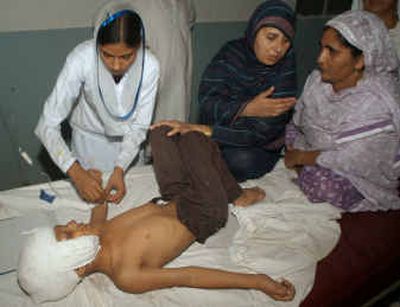Bomb in Shiite mosque kills 25

SIALKOT, Pakistan – A suicide attacker carrying a bomb in a briefcase struck a Shiite mosque crammed with hundreds of worshippers in eastern Pakistan, killing at least 25 people and wounding more than 50 during Friday prayers.
Shortly after the attack, experts defused a second bomb outside the mosque, where hundreds of angry Shiites had gathered to protest the attack.
No group claimed responsibility for the bombing. But a prominent Shiite cleric speculated it was in retaliation for the killing by security forces of a Sunni militant and top al Qaeda operative accused in the beheading of American reporter Daniel Pearl.
President Gen. Pervez Musharraf, a key U.S. ally, said the bombing showed “terrorists have no religion and are enemies of mankind.” He renewed his government’s commitment to root them out.
In the three years since Musharraf threw Pakistan’s support behind the U.S.-led war on terror, Islamic militants, often linked to al Qaeda, have launched repeated attacks against the government and Western targets.
Violence has also been directed at Shiites, who make up about 20 percent of Pakistan’s 150 million people, most of whom are Sunni Muslims. As in Iraq, where Sunni militants are suspected of carrying out provocative attacks on Shiites, sectarian tensions linger close to the surface in Pakistan.
The blast at 1:26 p.m. – during prayers for the Muslim sabbath – left a crater in the Zainabia mosque in the center of Sialzot and damaged its walls.
Witnesses said a man entered the mosque shortly before the blast carrying a briefcase which then exploded, Sialkot police chief Nisar Ahmed said.
“I was praying when I first saw a bright light and then something exploded with a big bang, and I fell down,” said Sajjad Anwar, 36, who was being treated at a hospital.
“I saw human body pieces hitting the walls and ceiling of the mosque,” he said.
Another injured, Mumtaz Ali Shah, 43, said: “My mind stopped working for a while after the blast, but when I opened my eyes, I was lying among dead bodies.”
Earlier, 26-year-old Mohammed Nawaz, who lives near the mosque, told AP: “When I came out of my home and went to the mosque, I saw a doomsday scenario. People were crying, pieces of body and blood were scattered everywhere inside the mosque.”
Police in Sialkot, 145 miles southeast of Islamabad, said they were almost certain the bombing was a suicide attack. An initial assessment by experts examining remains of the briefcase found it contained explosives.
Police said at least 25 people were killed and more than 50 wounded. A doctor at Allama Iqbal Hospital said some of the injured were in serious condition.
Shortly after the explosion, a bomb disposal squad found another briefcase bomb outside the mosque, said Mohammed Nazir, the squad’s chief.
Hundreds of angry Shiite youths went on a rampage after the attack. Police said the protesters damaged part of the hospital and dozens of vehicles and ransacked shops. Troops restored order.
A Shiite leader in the southern city of Karachi claimed the bombing was retaliation for the police shooting last weekend of Amjad Hussain Farooqi, a top Pakistani al Qaeda operative believed to be behind the kidnapping and beheading in 2002 of Wall Street Journal reporter Pearl, and two failed assassination attempts on Musharraf in 2003.
Farooqi allegedly planned previous bomb attacks on Shiites.
”Definitely, it was the work of the friends of Farooqi,” cleric Allama Hassan Turabi said. “The people who planned this attack perhaps don’t understand that we are not supporters of America. … We are also against America.”
Interior Minister Aftab Khan Sherpao claimed Farooqi’s killing by paramilitary police in the southern town of Nawabshah showed security agencies had “broken the back” of the al Qaeda’s network in Pakistan.
Farooqi was a member of the Sunni militant group Lashkar-e-Jhangvi, blamed for two bombings of Shiite mosques in Karachi in May that killed more than 40 people.